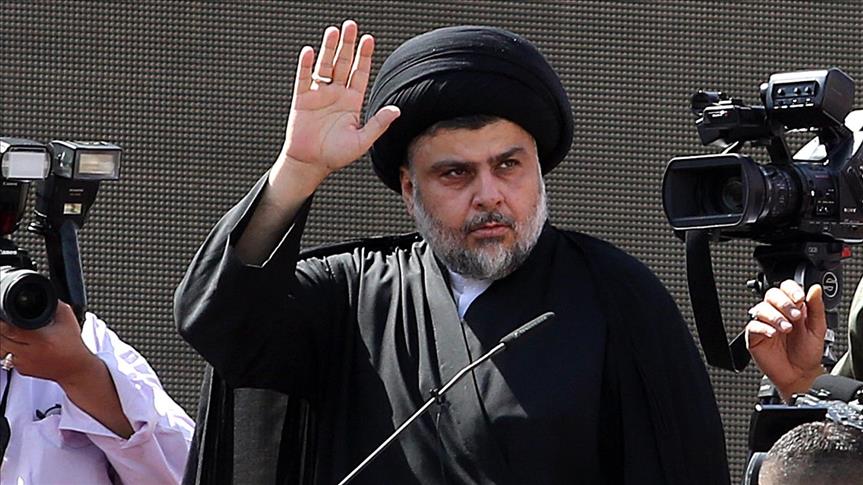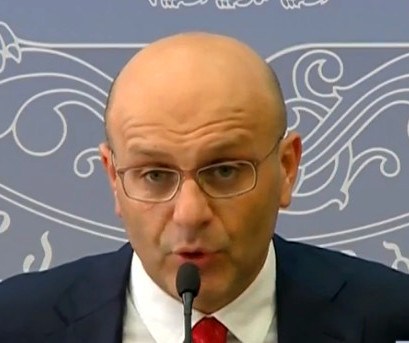
Anadolu Agency (12 July 2018)
Mahmoud Barakat
BAGHDAD
Prominent Iraqi Shia cleric and politician Muqtada al-Sadr on Thursday called on Prime Minister Haidar al-Abadi to resign from his Dawa Party in return for securing a third term in office.
Since last week, Iraqi electoral officials have been manually recounting ballots cast in the country’s May 12 parliamentary poll, official results of which remain dogged by dispute.
According to those results, Al-Sadr's Sairoon coalition dominated the vote, winning 54 parliamentary seats, followed by a Hashd al-Shaabi-linked coalition (47 seats) and al-Abadi's Victory Bloc (42 seats).
Al-Sadr seeks to form a new government “far from sectarianism or narrow political interests” with a mandate to fight corruption and carry out long-awaited reforms.
“We’re looking at new ways of drawing up coalitions in line with our reform plans,” Diaa al-Asadi, head of al-Sadr’s political bureau, told Anadolu Agency.
According to al-Asadi, talks remain underway between Sairoon; the Victory Bloc; the Hashd al-Shaabi-linked Al-Fatah Bloc; the National Wisdom movement (led by Ammar al-Hakim); and the Al-Wataniya Bloc (led by Vice-President Iyad Allawi).
Nevertheless, the choice of prime minister remains subject to considerable debate, al-Asadi said.
It appears that PM al-Abadi still has a chance to secure a third term in office if he is willing to resign from the Islamic Dawa Party, of which former PM Nouri al-Maliki is also leading member.
According to al-Asadi, al-Abadi’s resignation from the Dawa Party is a chief demand of most leading political blocs, including al-Sadr’s Sairoon coalition.
“Iraq faces numerous challenges at this sensitive stage,” he said. “We need a prime minister who enjoys independence and authority.”
Al-Sadr also holds al-Maliki responsible for the Daesh terrorist group’s ability to overrun much of the country -- including Mosul -- in mid-2014.
Al-Asadi also downplayed the extent of “foreign influence” on Iraq’s electoral process.
“Some parties may enjoy the support of certain entities,” he said, “but as long as these parties adhere to the national program -- and aren’t bound by foreign interests -- there should not be a problem.”
Known for his hostility to the U.S., al-Sadr led a faction of Shia fighters against foreign forces during the U.S.-led occupation of Iraq from 2003 to 2011.
He is also one of a small handful of Iraqi Shia political leaders who are not closely associated with Iran.
Since the regime of former Iraqi President Saddam Hussein was overthrown by U.S. and U.K. forces in 2003, both Washington and Tehran have played significant roles in the talks leading up to the formation of successive Iraqi governments.
https://www.aa.com.tr/en/middle-east/iraq-s-al-sadr-calls-for-independent-prime-minister/1202016
No comments yet.
-
 NEW GEORGIAN PM UNVEILS CABINET WITH THREE NEW NAMES
The Caucasus and Turkish-Armenian Relations
13.07.2018
NEW GEORGIAN PM UNVEILS CABINET WITH THREE NEW NAMES
The Caucasus and Turkish-Armenian Relations
13.07.2018
-
 IRAQ’S AL-SADR CALLS FOR ‘INDEPENDENT’ PRIME MINISTER
Iraq
13.07.2018
IRAQ’S AL-SADR CALLS FOR ‘INDEPENDENT’ PRIME MINISTER
Iraq
13.07.2018
- ARMENIA EX-PRESIDENT SERZH SARGSYAN RECEIVES KONRAD ADENAUER FOUNDATION’S REGIONAL DIRECTOR The Caucasus and Turkish-Armenian Relations 13.07.2018
- SERBIA DEMANDS A NEW FORMAT OF DIALOGUE WITH KOSOVO The Balkans 13.07.2018
- MOSUL, HEALTH EMERGENCY: A YEAR AFTER THE DEFEAT OF ISIS, 70% OF THE FACILITIES STILL OUT OF USE Iraq 13.07.2018
-
25.01.2016
THE ARMENIAN QUESTION - BASIC KNOWLEDGE AND DOCUMENTATION -
12.06.2024
THE TRUTH WILL OUT -
27.03.2023
RADİKAL ERMENİ UNSURLARCA GERÇEKLEŞTİRİLEN MEZALİMLER VE VANDALİZM -
17.03.2023
PATRIOTISM PERVERTED -
23.02.2023
MEN ARE LIKE THAT -
03.02.2023
BAKÜ-TİFLİS-CEYHAN BORU HATTININ YAŞANAN TARİHİ -
16.12.2022
INTERNATIONAL SCHOLARS ON THE EVENTS OF 1915 -
07.12.2022
FAKE PHOTOS AND THE ARMENIAN PROPAGANDA -
07.12.2022
ERMENİ PROPAGANDASI VE SAHTE RESİMLER -
01.01.2022
A Letter From Japan - Strategically Mum: The Silence of the Armenians -
01.01.2022
Japonya'dan Bir Mektup - Stratejik Suskunluk: Ermenilerin Sessizliği -
03.06.2020
Anastas Mikoyan: Confessions of an Armenian Bolshevik -
08.04.2020
Sovyet Sonrası Ukrayna’da Devlet, Toplum ve Siyaset - Değişen Dinamikler, Dönüşen Kimlikler -
12.06.2018
Ermeni Sorunuyla İlgili İngiliz Belgeleri (1912-1923) - British Documents on Armenian Question (1912-1923) -
02.12.2016
Turkish-Russian Academics: A Historical Study on the Caucasus -
01.07.2016
Gürcistan'daki Müslüman Topluluklar: Azınlık Hakları, Kimlik, Siyaset -
10.03.2016
Armenian Diaspora: Diaspora, State and the Imagination of the Republic of Armenia -
24.01.2016
ERMENİ SORUNU - TEMEL BİLGİ VE BELGELER (2. BASKI)
-
AVİM Conference Hall 24.01.2023
CONFERENCE TITLED “HUNGARY’S PERSPECTIVES ON THE TURKIC WORLD"









